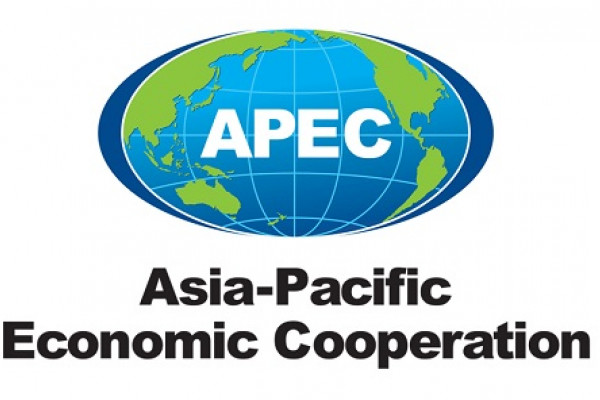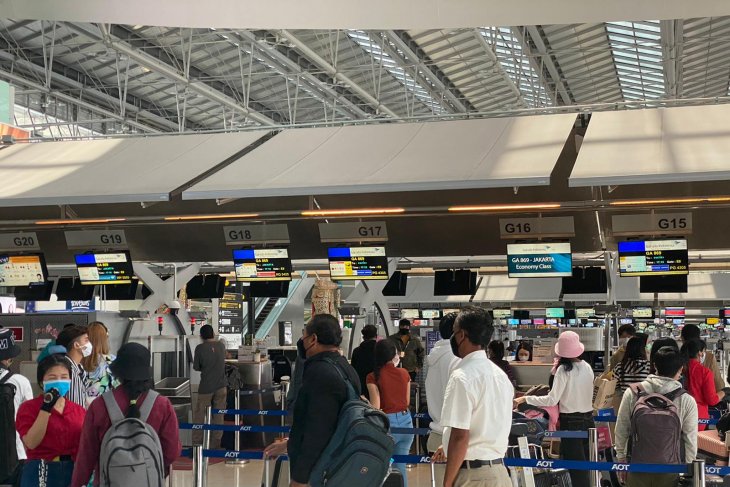Live Streaming
Program Highlight
Company Profile
April
APEC Faces Output Loss of US$2.1 Trillion Owing to COVID-19
Written by Ani Hasanah
The health and economic crisis caused by the COVID-19 pandemic afflicted over two million people globally, with 40 percent from the APEC region, according to a new policy brief by the APEC Policy Support Unit.
The policy brief, titled "APEC in the Epicentre of COVID-19", breaks down the vast and unparalleled impact of the pandemic on the livelihoods of people and small businesses that constitute 97 percent of all firms in the region.
The APEC region’s growth is projected to decline by 2.7 percent this year, from 3.6 percent in 2019, thereby being the most significant drop since the near-zero growth rate recorded in 2009 during the global financial crisis.
The reduction in growth translates to an estimated output loss of US$2.1 trillion due to the economic fallout from the pandemic, and it was compounded by an additional 23 million people becoming unemployed in 2020, the APEC Policy Support Unit noted in a written statement received by Antara News Agency in Jakarta on Tuesday.
"The APEC region is on the frontlines for meeting this challenge since member economies are among the first and worst affected by the pandemic. A crisis of unprecedented severity calls for a response of unprecedented scale," APEC Secretariat Executive Director Rebecca Sta Maria emphasized.
The policy brief projects an economic rebound in 2021, with the APEC region anticipated growing by 6.3 percent, higher than the estimated global economic growth of 5.8 percent.
"As hopeful as it appears, the rebound is conditional on the effectiveness of members’ containment mechanisms to avoid a further wave of the pandemic later this year," APEC Policy Support Unit Director Denis Hew remarked.
The unprecedented shock to the global economy necessitates a well-targeted and coordinated regional response towards socioeconomic recovery, including greater support for healthcare systems and increased social protection.
The APEC region has an average of 4.1 hospital beds, 1.9 physicians, and 3.9 nurses or midwives per one thousand people. Despite an improvement in these figures since the SARS outbreak in 2003, the current capacity of health systems is insufficient, taking into account the significantly higher infection rates and the uncertainty over the span of time that the COVID-19 pandemic will last.
All 21 APEC member economies are rolling out significant and targeted fiscal measures, ranging from one percent to 20 percent of the gross domestic product to tackle the impact of COVID-19, including assistance for the unemployed and small- and medium-sized enterprises.
"Member economies quickly rose to the challenge by introducing fiscal and monetary measures. The focus now is for members to come together for coordinated multilateral cooperation to support our people and small businesses," Sta Maria noted.
"Only by working together will we be better equipped to weather this pandemic and fast track our recovery," she affirmed.
Regional and international organizations, such as the APEC, have a key role to play in ensuring that members continue to exchange relevant public health information, including updates on containment measures, and the development of testing kits, treatments, and vaccines.
Regional cooperation can likewise contribute to boosting healthcare access and capacity among member economies.
The policy brief also suggests that APEC members should work to ensure a continuous supply of medical goods and food. It encompasses eliminating trade-restrictive measures on essential goods to help with the response to the crisis and eventual recovery.(ANTARA)
April
356 Indonesians Repatriated from Thailand after Flights Suspended
Written by Ani Hasanah
The Indonesian Embassy in Bangkok facilitates the repatriation of Indonesians stranded in Thailand following the Thai policy to suspend commercial flights to the country. (HO-KBRI Bangkok)
The Indonesian Embassy in Bangkok repatriated 356 Indonesians mostly stranded following Thailand's policy to suspend international commercial flights to the country from April 4 to April 30, 2020.
The Thai policy is part of the efforts to thwart the spread of COVID-19, especially to curtail the number of coronavirus cases from abroad.
For its part, the embassy has taken requisite steps in cooperation with national flag carrier Garuda Indonesia to repatriate the Indonesians.
Garuda Indonesia has secured a special permit from the Thai government to fly home the Indonesians on April 20-23, the embassy noted in a written statement released on Monday.
Indonesian Ambassador to Thailand Ahmad Rusdi noted that the repatriation of Indonesians from Thailand is a demonstration of the government's commitment to protecting Indonesians regardless of their location.
Most Indonesians are tourists and students opting for an apprenticeship program at several hotels and tourist resorts in Thailand. Majority of the Indonesians had been in Thailand since early and late March 2020.
Romanus Seran Bria, one of the Indonesians working as a soccer coach, expressed gratitude to the embassy for its efforts to repatriate Indonesians in the midst of the COVID-19 pandemic.
Furthermore, the embassy has offered them logistics, including food and vitamins, while they await repatriation to Indonesia. (ANTARA)
China Donates Medical Supplies to ASEAN Secretariat for COVID-19 Prevention
Written by Ani HasanahIn a show of solidarity to combat the COVID-19 pandemic, the Chinese government donated medical supplies to the ASEAN Secretariat (ASEC). The donation consists of 75,000 surgical masks, 300 bottles of hand sanitizers (500ml) and 35 infrared thermometers that will be utilised by the staff of ASEC.
Secretary-General of ASEAN Dato Lim Jock Hoi received the contribution from China's Ambassador to ASEAN Deng Xijun in a closed handover ceremony held at the ASEAN Secretariat in Jakarta Tuesday.
The Permanent Representatives of the Philippines and Viet Nam to ASEAN, Ambassador Noel Servigon and Ambassador Tran Duc Binh, respectively, witnessed the ceremony.
Secretary-General Dato Lim said, "Today's contribution of medical supplies and equipment to the ASEAN Secretariat is much appreciated, particularly during this challenging time. In observing further social distancing measures, and personal hygiene and sanitation, these supplies of medical masks, hand sanitisers, and infrared thermometers will certainly benefit more than 300 staff of the ASEAN Secretariat."
He added that with the contribution, "the adage of 'Stay Strong ASEAN' is not only to be realised at the political level in the region but also very much extended to the welfare and well-being of each staff at the ASEAN Secretariat. With this aid, we demonstrate that we support one another even at the community and individual levels in ensuring that we stay safe and healthy."
Ambassador Xijun elaborated that "When COVID-19 broke out in Wuhan, people from all walks of life in ASEAN countries and ASEC expressed sympathy and support of all forms to China. China has made major progress in fighting COVID-19 at home. With all the necessary control measures in place, China is also working hard to assist ASEAN toward an early victory against the disease."
The ASEAN Health Sector's cooperation with China's health counterparts has continued strongly through open and timely technical exchanges and information sharing. Technical coordination, assistance and updated exchanges are currently pursued at the levels of the senior health officials, health experts and Health Ministers through the ASEAN-China or ASEAN Plus Three Health platforms.
Last week, at the ASEAN Plus Three Special Summit on COVID-19, Chinese Premier Li Keqiang announced that China will provide another 100 million face masks, ten million protective gears, and other urgently needed medical supplies to ASEAN Member States as a grant assistance and via commercial channels. (Release ASEAN Secretariat)
April
Minister Indrawati Invites Citizens of Nation to Become Heroes of Humanity
Written by Ani Hasanah
Minister of Finance Sri Mulyani Indrawati. ANTARA FOTO
Indonesian Finance Minister Sri Mulyani Indrawati while highlighting the spirit of Kartini Day called on all citizens of the nation to become the heroes of humanity despite being confined to their homes during the COVID-19 outbreak.
"Akin to Kartini, the walls of the house should not prevent us from caring for our fellow human beings," Indrawati was quoted as saying through her personal Instagram account @smindrawati in Jakarta, Tuesday.
Dressed in a white kebaya and batik cloth, she recalled that a century ago, Raden Ajeng Kartini was locked in a house owing to the customary, social, and cultural rules followed during that time.
However, the obstacles did not pose a hindrance to the national hero to continue to work and voice his concern for his fellow human beings.
Indrawati emphasized that Kartini's spirit is expected to serve as a guiding beacon for Indonesians today to unitedly fight COVID-19.
"The Creator expects humanity to be able to always care for their fellow humans and protect the universe. Have we all cared?" the minister questioned.
The former managing director of the World Bank is optimistic that by staying at home, the community would be able to help the government and fellow humans fight the COVID-19 pandemic at least by curbing the spread of the disease.
Staying at home also helps medical workers, doctors, nurses, and hospital employees, currently at the forefront and viewed as the heroes of humanity, to shield people from the threat of COVID-19.
"Congratulations on the commemoration of the spirit of Kartini Day. Hopefully, all of you, all of us, can become the heroes of humanity," Indrawati stated. (ANTARA)



